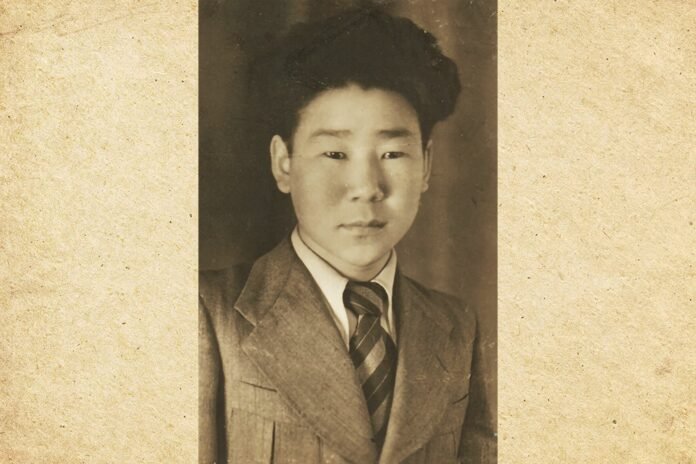He met Victory Day on May 9, 1945 on Russky Island, with the rank of cadet at the Electrical Engineering School of the Pacific Fleet. And before, in 1943, he tried to escape to the front.
Nanai Municipal District Local Lore Museum
Beldy Nikolai Ivanovich. He was awarded the Nakhimov Medal, the medals “For Victory over Germany” and “For Victory over Japan”, the Order of the Patriotic War of the 2nd degree and the Ushakov Medal. 1946
14-year-old Nikolai Beldy went to fight, hiding in a box under a train car. He arrived in Khabarovsk and managed to enter the army. But the echelon was naval, Pacific sailors headed in the opposite direction from the front to Vladivostok. Taking pity on the ragged and hungry boy, they took him with them and helped him settle on Russky Island. He lives and be happy. But Kola Beldy still managed to fight.
Golden Voice of the North
In the seventies of the last century, his hits “I’ll take you to the tundra” and “And the reindeer are better” were heard daily throughout the country, from the Arctic to the Caucasus. During thirty years of active concert activity, he performed in 46 countries around the world, becoming one of the most recognized Soviet artists. There were sold out tickets at the famous Olympia concert hall in Paris and an order presented by the Emperor of Ethiopia. The mayor of the French city of Mezen proclaimed him the “Golden Voice of the North.” He also auditioned for the role of Dersu Uzala in the famous Akira Kurosawa film, he did not pass the film test, but for many years he maintained friendly relations with the world famous film director…
Kola Beldy at a concert in Surgut. 1970-1980 Photo: Surgut Museum of Local Lore
The future singer’s childhood was not easy. Nikolai Ivanovich Beldy (Kola is a stage name) was born in May 1929 in the village of Mukha, Khabarovsk Territory, in the family of a Nanai hunter. He was soon orphaned: his father died in a fight with a bear and soon his mother died. Furthermore, the boy suffered a severe nervous shock when he got lost in the taiga, and from that moment on he began to stutter. Nicholas was taken in by his relatives, but soon ended up in a boarding school in the national village of Naykhin.
Battle of Seishin
On August 12, 1945, Red Navy soldier Nikolai Beldy, as part of the crew of the minesweeper TSCH-278, participated in the battle for the capture of the Korean port of Seishin. The next day, already with a detachment of marines, he crossed a corridor to one of the marine units that was surrounded. He suffered shock from a projectile explosion and lost consciousness. When I woke up, the Japanese were in charge of the destroyed room.
Kola Beldy, Honored Artist of the Yakut Autonomous Soviet Socialist Republic. 1980s Photo: Nanai Municipal District
Nicholas was saved because of his Asian appearance. The Japanese took the boy lying in a black coat with no identifying marks as one of their own and did not touch him. And soon the marines regained their lost positions, and with them the Red Army soldier Nikolai Belda.
It is interesting that after the concussion he received, the young man’s stuttering almost disappeared and he soon discovered a beautiful voice. At first he performed in amateur naval performances, then in the Pacific Fleet Song and Dance Ensemble. While still in military service, as a diesel engine mechanic on a minesweeper, he was able to graduate from music school as an external student.
In memory of the last battles of the Second World War, the most revered medals of the fleet – Nakhimov and Ushakov – shone on the chest of the sixteen-year-old sailor.
unfinished song
And then there was a long peaceful life.
He studied at the Saratov State Conservatory, named after LV Sobinov, in the singing class and the student combined classes with work at a machine tool plant. Voronezh Military District Song and Dance Ensemble. Kalinin and Khabarovsk Philharmonic…
The singer broke into the All-Union level in 1957, becoming a laureate of the World Festival of Youth and Students in Moscow. The then Minister of Culture Ekaterina Furtseva and the poet Sergei Mikhalkov drew attention to him. The young and talented artist was invited to work in Moscow, where from 1959 to 1990 he was soloist and vocalist of the All-Russian Concert and Touring Association, which was later reorganized into Mosconcert.
Mosconcert poster. 1980s Photo: Khabarovsk Regional Museum named after. NI Grodeková
The result of many years of creative activity of the singer was seven vinyl records, numerous audio cassettes, video clips and several films about the life and work of Kol Belda. The sonorous and pleasant timbre of his voice cannot be confused with anyone else’s. The theme of his work is the life of small towns in the North and their nature.
In 1990, after completing his active creative work, the singer returned to his native Khabarovsk. On December 21, 1993, I went to the grocery store and grabbed my heart right on the sales floor…
The entire Far Eastern city buried its beloved singer and compatriot.

